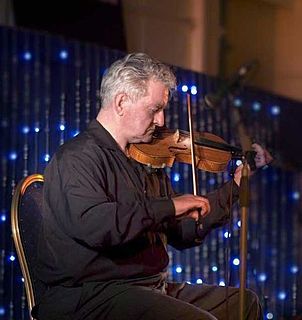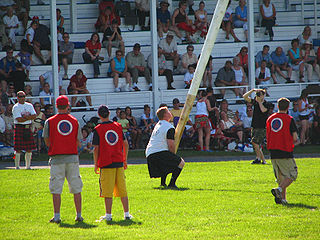Related Research Articles

The Donegal fiddle tradition is the way of playing the fiddle that is traditional in County Donegal, Ireland. It is one of the distinct fiddle traditions within Irish traditional music.

A pipe band is a musical ensemble consisting of pipers and drummers. The term used by military pipe bands, pipes and drums, is also common.
A strathspey is a type of dance tune in 4
4 time. It is, simply stated, a reel played at a slightly slower tempo, with slightly more emphasis on certain beats. This emphasis can be the same measure to measure or vary throughout the tune, depending on the player. Cut-dot snap rhythms, or "Scotch snaps", are a feature of both. These are short notes before a dotted notes, which in traditional playing is generally exaggerated rhythmically for musical expression. An example of a strathspey would be the song "The Bonnie Banks o' Loch Lomond", provided it is sung staccato:
The Northern Meeting is a gathering held in Inverness, Scotland, best known for its solo bagpiping competition in September.

Glasgow Police Pipe Band is a grade one pipe band from Glasgow, Scotland. Founded in 1883 as the Burgh of Govan Police Pipe Band, the band enjoyed its greatest competitive success as the Strathclyde Police Pipe Band.
Lothian Schools Strathspey and Reel Society is an amateur Scottish fiddle orchestra based in Edinburgh, Scotland. The society consists of around 30 fiddlers, 2 cellists and currently 2 double bassists. They play at many concerts throughout the year and also attend the Kirriemuir Fiddle Festival every November, which, for the last two years running, they have won the large group competition and last year won the quartet competition.
Scottish fiddling may be distinguished from other folk fiddling styles by its particular precision of execution and energy in the delivery, for example, the rendering of the dotted-quaver/semi-quaver rhythmic patterns, commonly used in the Strathspey. Christine Martin, in her Traditional Scottish Fiddling players guide, discusses the techniques of "hack bowing", "the Scottish Snap", and "snap bowing". These techniques contrast quite sharply with the most common bowing patterns of Irish fiddling. The style has a very large repertoire consisting of a great variation of rhythms and key signatures. There is also a strong link to the playing of traditional Scottish bagpipes which is better known throughout the world.
This article defines a number of terms that are exclusive, or whose meaning is exclusive, to piping and pipers.
The Victoria Police Pipe Band is a former Grade One World Pipe Band Championship-winning pipe band based in Melbourne, Australia. The band still operates today, though with reduced numbers and not competitively, after a controversial decision in 2000 to reshape it.
Ceòl beag is the Gaelic-language term for "light music", which in bagpiping includes such forms as marches, strathspeys, reels, jigs, polkas, slow airs, and hornpipes, as well as pipe tunes played in non-traditional idioms such as rock, punk, and jazz. The term is used in juxtaposition to ceòl mòr.
The Scots Trad Music Awards were founded in 2003 by Simon Thoumire to celebrate Scotland's traditional music in all its forms and create a high profile opportunity to bring the music and music industry into the spotlight of media and public attention. Nominations are made by the public and in 2019 over 100,000 public votes were expected across 18 categories.
The World Pipe Band Championships is a pipe band competition held in Glasgow, Scotland. The World Pipe Band Championships as we currently know them have been staged since 1947 although the Grade 1 Pipe Band Competition winners at the annual Cowal Highland Gathering were recognised as World Champions as far back as 1906. Although titled "The World Pipe Band Championship" this designation was made by the Royal Scottish Pipe Band Association (RSPBA) without consulting any other Pipe Band Association. Even though bands around the world compete the vast majority of bands that enter are from the United Kingdom. For competitive bands, the title of World Champion is highly coveted, and this event is seen as the culmination of a year's worth of preparation, rehearsal and practice. There are no qualifications to enter, bands do not have to enter or win any other competitions. The only requirement is the band is a member of the RSPBA or a Pipe Band Association recognized by the RSPBA

The Glengarry Highland Games consist of a series of traditional Scottish competitions held annually in Maxville, Ontario, Canada, usually held the first weekend in August. The games span three days and attract over 20,000 people, they are the largest Highland Games of its kind outside Scotland. The Glengarry Highland Games are primarily intended to be a showcase of traditional Scottish heavy events, Highland Dance, pipe and drum competitions.

The Cowal Highland Gathering is an annual Highland games held in the Scottish town of Dunoon, on the Cowal peninsula in Argyll and Bute, over the final weekend in August.
Margaret Dunn is an Irish bagpiper, originally from Cullen, County Cork, now living in Scotland.

The Scottish tenor drum is a musical instrument used within Scottish pipe bands. It is a double-headed membranophone that is held vertically with one head up, one head down, and played with soft mallets on the top head only. Common sizes of drums are 15, 16, 18, or 20 inch in diameter, with 12, 14, or 16 inch depth. The playing style of the Scottish tenor drum has varied throughout the years, but there is typically a variation of the combination of swings and rhythmic accompaniment to the Scottish snare drum and the Great Highland Bagpipes. It is similar to the more common marching band style tenor drum.
George Hepple (1904–1997) was an influential traditional Northumbrian fiddler. He was born at Sook Hill Farm, Haltwhistle, West Northumberland. He went to a nearby school in Melkridge. He began his working life as an apprentice blacksmith at Cawfield's Quarry at the age of fourteen, before moving to Ventners Hall Colliery where he remained until its closure in the 1950s. He then worked at Bardon Mill Colliery. He later worked in a plastics factory in Plenmellor, South of Haltwistle, until his retirement. In the last years of his life, he lived with his wife Edna in sheltered housing in Haltwhistle. At this time, he also had a pacemaker implanted and when the doctor said he should return to have the battery replaced, in 10 years, he replied "I don't need to worry about that then!".
Gordon Walker is a bagpiper.
Alasdair Gillies was a Scottish bagpiper and tutor, and one of the most successful competitive solo players of all time.
Donald MacPherson was a Scottish bagpipe player, and one of the most successful competitive solo pipers of all time.
References
- ↑ "March, Strathspey and Reel Playing" (PDF). Schoolofpiping.com. Retrieved 19 November 2018.
- ↑ "BBC - Bitesize Music, Scottish - March, Strathspey & Reel". BBC.
| This music-related article is a stub. You can help Wikipedia by expanding it. |